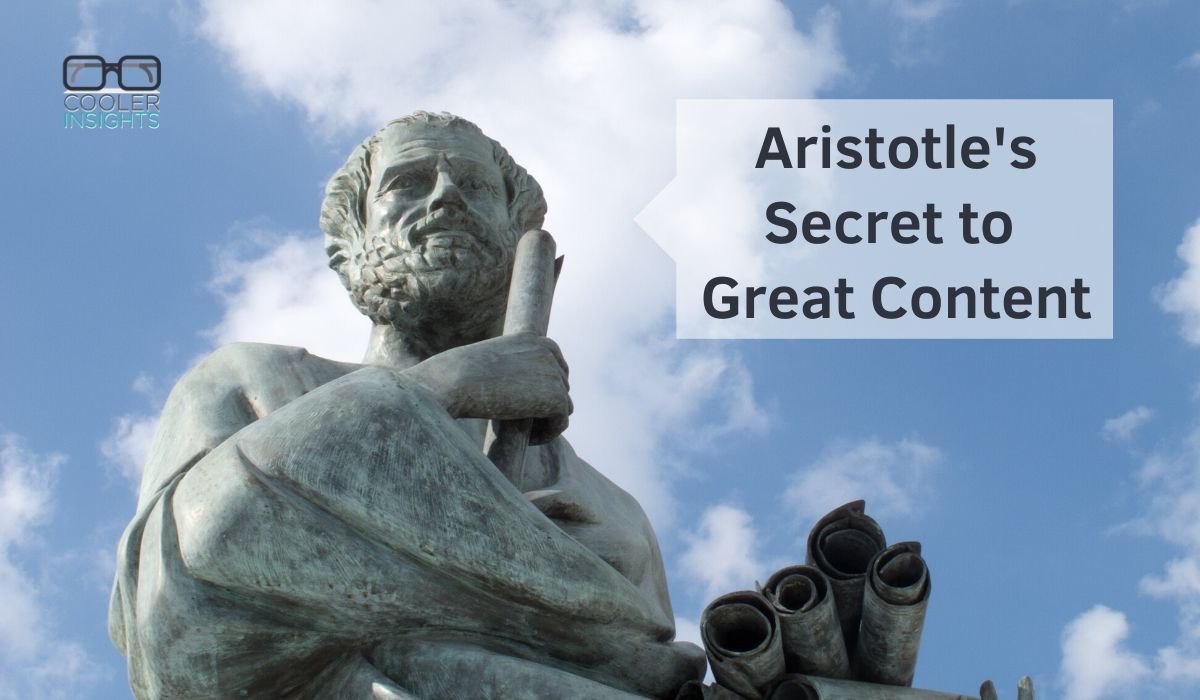
“File:Philosophie-grèce Aristotle.jpg” by solut_rai is licensed under CC0 1.0
Ancient Greek philosopher Aristotle has an ageless recipe for great content that rocks. One that is proven to work time and time again, across the centuries.
Do you want to know what it is?
Three words: Ethos, Pathos and Logos.
Also known as his appeals or timeless proofs, these three tenets of rhetoric can be understood as follows.
Ethos
Ethos is a Greek word which means credibility or ethical appeal. It looks at the character and reputation of the content producer or author and assesses him or her for what that is worth. The root word for “ethics” comes from ethos.
When evaluating the ethos of a person, we should ask if the person is worthy of respect in the specific field.
Does he have authority in the domain? Is her years of experience and exposure relevant to what she is claiming now? More importantly, can he or she be trusted?
Generally, we tend to believe people whom we look up to in a domain area.
Pathos
Pathos looks at the emotional dimension of persuasion. Any form of content – text, videos, audio podcasts, or photos – need to ignite the hearts of its readers, viewers and listeners.
Here, the different elements of language, expressions, choreography, pace, tone of voice and acting can either help or hinder an audience’s response. Content that can resonates with an audience tends to be those which are emotionally rich and evocative.
A key part of demonstrating pathos is by displaying empathy. If you show that you care for others, there is a higher likelihood that they will care about your content and what it says to them.
Logos
Logos or logic looks at the cognitive aspect of reasoning as a means of persuasion. Content that is logical and reasonable will appeal to the intellect of the recipient. Conversely, illogical content will just fly by the eyes and ears of its audiences.
To strengthen the logos of one’s content, we can use various forms of critical thinking and analysis. Three of the most commonly used methods are:
- Deductive reasoning: a logical process in which a conclusion is developed based on achieving multiple premises that are assumed to be correct. Also known as top-down logic, it starts out with a hypothesis, and examines how a logical end could be reached as various possibilities are narrowed down.
- Inductive reasoning: this is the exact opposite of deductive reasoning. Here, broad generalisations and inferences are made from specific observations under similar circumstances.
- Empirical methods are used when conclusions are derived based on actual observations and experience rather than theories.
Using the 3 Timeless Proofs
To strike a chord with your audiences in any form of content production – documents, web pages, advertisements, speeches, videos, letters and so on – do bear in mind the three timeless “proofs”.
All three must work hand-in-hand to succeed.
Without ethos, one is unable to convince one’s readers that one has the necessary experience or education to wax lyrical about a proposed topic. The credibility and authority of one’s content is at stake here.
Without pathos, one may be the most qualified person in the world to speak about a particular topic, yet end up putting one’s audiences to sleep. The ability to persuade and connect emotionally is at play here.
Without logos, the most emotionally stirring presentation put forth by a senior spokesperson would appear confusing and unconvincing. The intellectual rigour and logic of one’s content is in focus here.
The next time you want to embark on writing or producing any form of content, think about how you can increase your ethos, pathos and logos. Together, these elements help to ensure that whatever you create is well regarded by your target audiences, resonates emotionally with them, and satisfies their intellectual curiosity.

Thank you for sharing with us, I believe this website
really stands out :D.